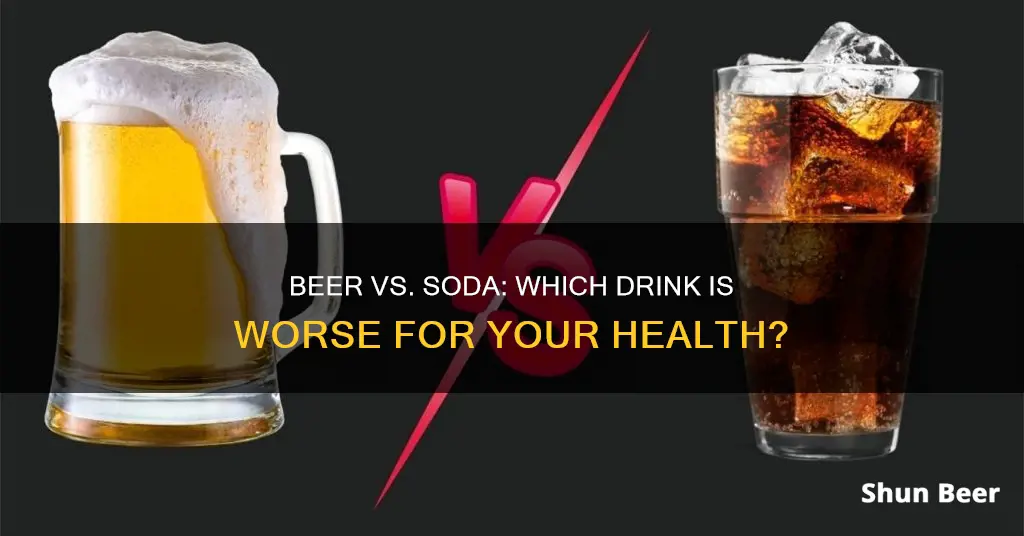
Beer vs soda: which is worse for your health? It's a tricky question, as both drinks have their pros and cons. Beer, for instance, contains B vitamins and minerals, whereas soda has zero nutritional value. Beer also has no sugar, and fewer calories and carbs than soda. On the other hand, soda is a non-alcoholic drink, so it doesn't impair your judgement or coordination, and it won't give you a hangover. So, which is the lesser of two evils?
What You'll Learn

Beer has no sugar, soda often has high sugar content
When it comes to health, what we drink is just as important as what we eat. Beer and soda are two of the most popular drinks in the world, but which is worse for you?
Beer contains very little sugar. The sugar content varies depending on the type and brand of beer, but generally, beer has less sugar than other alcoholic drinks like wine. However, some beers can have higher sugar content due to added ingredients like honey or corn syrup. During the brewing process, barley is converted into fermentable sugar, which is then fermented by yeast to produce alcohol. This means that most of the sugar in beer is converted into alcohol, resulting in a low sugar content.
On the other hand, soda often has a high sugar content. Non-diet versions of soda are usually very high in sugar. For example, Coca-Cola's original formulation contains 39 grams of added sugars in a 12-ounce can, and a 20-ounce bottle of Dr. Pepper contains 64 grams. These sugar levels are extremely high and can lead to various health problems, from bad teeth to obesity and depression.
While beer may contain small amounts of sugar, it's important to note that it can still affect your blood sugar levels. Beer contains carbohydrates that can raise your blood sugar, and the alcohol in beer can cause a drop in blood sugar levels. This can lead to a delicate balance for people monitoring their blood sugar, especially those with diabetes or hypoglycemia.
In conclusion, when comparing beer and soda, beer has significantly less sugar content. However, it's important to remember that both drinks can affect your health in different ways, and moderation is key. Enjoy your favourite drink in moderation and be mindful of your overall health and well-being.
Athletic Beers: Healthy or Just Hype?
You may want to see also

Beer has nutritional value, soda has none
Beer is made from grains, which can be healthy, and contains some vitamins and minerals. It has no fat and no sugar. Beer provides thiamin, riboflavin, niacin, vitamin B-6, folate, and vitamin B-12. It also contains potassium, calcium, thiamine, iron, and zinc.
The USDA has analysed the contents of both beer and soda. While cola contains most of the minerals found in beer, it contains no vitamins at all.
Beer also has fewer calories and less carbohydrates than soda. A 12-ounce can of classic Coca-Cola has 140 calories, while a 12-ounce serving of Budweiser has 144 calories.
Beer has a lower glycemic load than soda. The glycemic load includes both the quality and quantity of carbohydrates and is a more accurate measure than the glycemic index, which only measures the quality of carbohydrates. A lower glycemic load can lead to weight loss, better blood sugar control, and a reduced risk of circulation disease and diabetes.
While beer has nutritional value, it is not a good source of vitamins and minerals compared to whole foods like fruits and vegetables. You would need to drink large amounts of beer to reach your daily nutrient requirements, and the health benefits of light to moderate drinking can be achieved through a varied, nutrient-rich diet.
In addition, the negative health effects of heavy drinking far outweigh any potential benefits of beer. Heavy drinking is linked to an increased risk of early death, alcohol dependence, depression, liver disease, weight gain, and cancers.
Beer and Diabetes: What's the Verdict?
You may want to see also

Beer is linked to fewer diseases than soda
When it comes to health, what we drink is just as important as what we eat. Beer and soda are two of the most popular drinks in the world, but which is worse for your health?
Beer and soda are both largely made of water. However, beer contains some nutrients and chemicals that may be beneficial to your overall health. Beer contains B-vitamins, as well as minerals including potassium, magnesium, biotin, phosphorous and selenium. In contrast, soda contains no vitamins or minerals. Coca-Cola Energy contains added vitamin B3 and B6, and Dr. Pepper contains calcium, zinc, iron, manganese, phosphorous and a small amount of selenium. But these are the exception, not the rule.
Beer and soda both contain calories, but beer has no sugar, whereas soda is usually very high in sugar. A typical can of Coke contains 39 grams of added sugar, and a 20-ounce bottle of Dr. Pepper has 64 grams. The high sugar content of soda can lead to a range of health issues, from dental problems to obesity, depression, diabetes, acne and even faster-ageing skin.
Beer and soda can both be addictive, and both can cause a release of endorphins in the brain. However, the more beer you drink, the more inebriated you become, which can lead to impaired decision-making and response times. There is no safe level of alcohol consumption, and regularly drinking more than 14 units per week can lead to a host of health problems, including anxiety, depression, heart disease, liver damage, reproductive issues and cancer.
When it comes to diseases, both alcohol and sugar are linked to liver and heart health issues, as well as problems with kidney function. However, diabetes is a major player in sugar-related deaths, and it does not appear on the list of alcohol-related deaths. According to the American Diabetes Association, 40% of all death certificates have diabetes listed on them. A European study of 350,000 people from eight countries found that one soda per day can increase your chances of developing diabetes by 22%.
In conclusion, while both beer and soda can be harmful to your health, beer is linked to fewer diseases than soda.
Tequila vs Beer: Which Alcoholic Drink is Healthier?
You may want to see also

Beer has fewer calories than soda
When it comes to health, what we drink is just as important as what we eat. Alcohol and sugar are both toxins, and both beer and soda are bad for you. However, beer has fewer calories than soda.
A typical 12-ounce beer has as many calories as a can of Coke (140). Some beers have twice that amount. However, light beers typically have about 50 fewer calories per 12-ounce can than regular beers. A 12-ounce can of Diet Coke has no calories, while a 12-ounce bottle of Bud Light has 110 calories. Heineken's 0.0 non-alcoholic beer has just 69 calories. So, while regular beer and soda have similar calorie counts, light beers and diet sodas have significantly fewer.
Beer also has the advantage of having no sugar. Regular-strength beer contains no sugar, but low-alcohol and non-alcoholic beers do. A typical low-alcohol beer has 2.4 grams of sugar per fluid ounce, which is still lower than soda but considered fairly high.
The glycemic load (GL) is another important factor to consider. Beer has only half the GL (7.5) of soda (15.0). A lower GL leads to various health benefits, including weight loss, stable blood sugar levels, reduced risk of circulation disease, and a lower risk of diabetes.
While beer has fewer calories than soda, it's important to remember that alcohol consumption can lead to various health issues. There is no safe level of alcohol consumption, and excessive drinking can cause problems such as anxiety, depression, heart disease, liver damage, reproductive issues, and cancer. Additionally, alcohol impairs the body's ability to absorb vitamins and minerals. Therefore, it's crucial to drink in moderation and treat regular-strength beer as an occasional treat.
Unfiltered Beer: Healthier Choice or Marketing Ploy?
You may want to see also

Soda is worse for dental health
While both beer and soda have their negative health impacts, soda is worse for your dental health. Soft drinks are one of the leading causes of tooth decay. The carbonation, sugar, and acids in soda weaken tooth enamel and encourage the growth of bacteria that contribute to decay.
The sugar in soda combines with bacteria in the mouth to form acid, which attacks the teeth. Each acid attack lasts about 20 minutes and restarts with every sip. The acids in soda can also directly erode enamel, even if the drink is sugar-free. Enamel dissolving from exposure to sugar increases the risk of cavities, which can lead to pain, sensitivity, problems eating and speaking, tooth loss, and severe gum disease.
While beer has its negative health effects, particularly for those with alcohol addiction, it does not have the same impact on dental health as soda. Beer has no fat, sugar, or carbs, and it contains various B vitamins and minerals. Therefore, when it comes to dental health, soda is worse.
To mitigate the harmful effects of soda on teeth, it is recommended to drink in moderation, use a straw, rinse with water, and wait at least 30 minutes before brushing. However, the best way to protect dental health is to limit soda consumption and opt for healthier alternatives.
Kombucha Beer: Healthy Beverage or Just Another Fad?
You may want to see also
Frequently asked questions
Beer contains alcohol, soda doesn't.
There is no clear answer. Both drinks are bad for you in excess. However, soda has zero health benefits, while beer contains B vitamins and minerals.
Beer has no fat, sugar or carbs, and fewer calories than soda. So, contrary to popular belief, drinking soda is more likely to give you a "beer belly".
Soda is very high in sugar, which is bad for your dental health. Beer doesn't contain any sugar.
People with liver or kidney conditions should avoid alcohol, as it puts stress on these organs. If you have hepatitis C, you should also avoid caffeine, which is found in some sodas.







